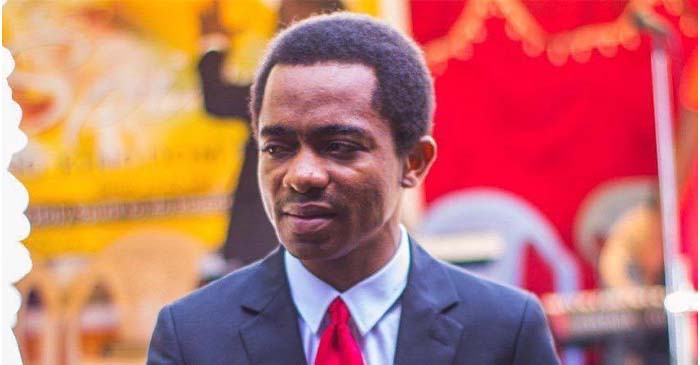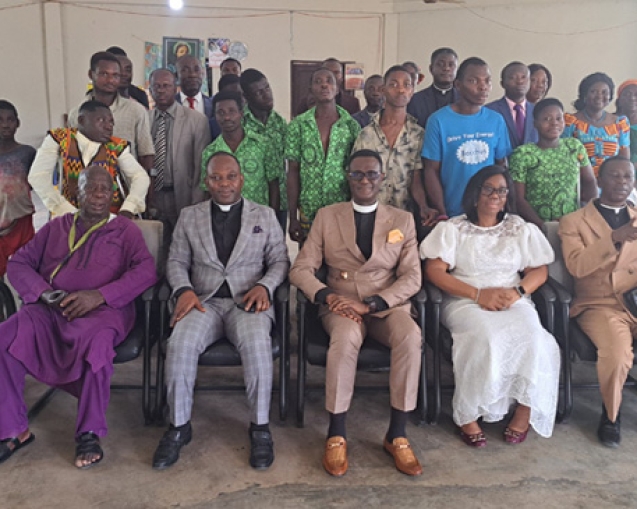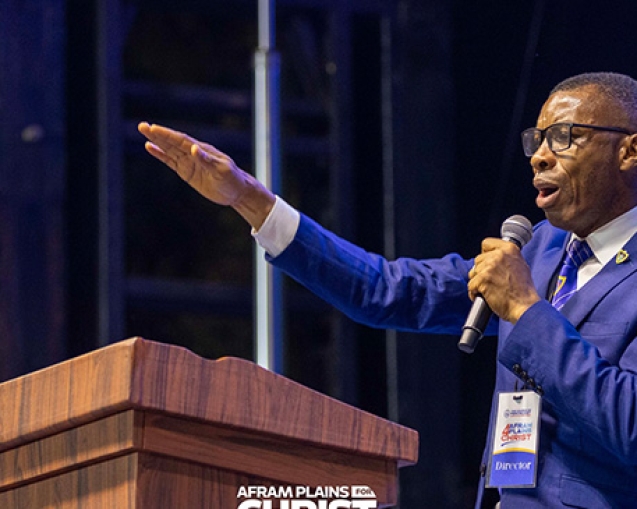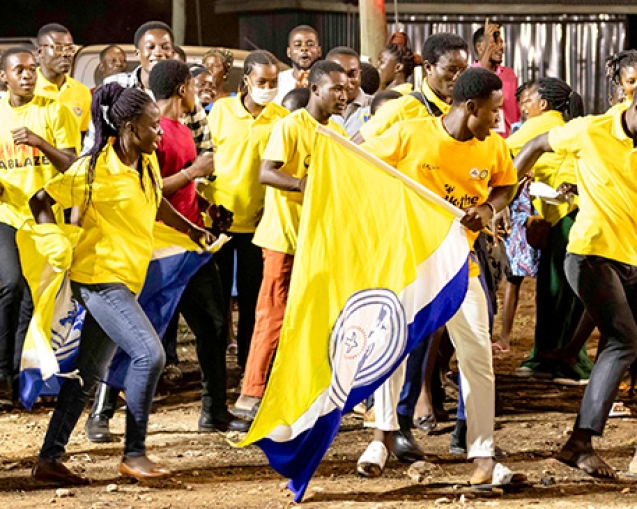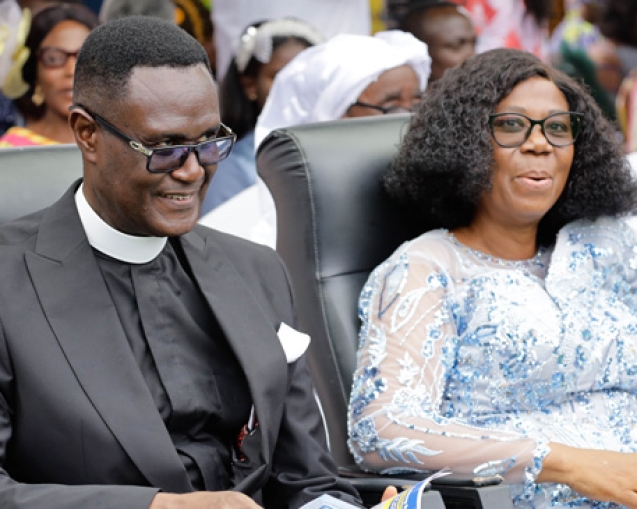Keeping A Bird’s-Eye View On The Prophetism Scene At 31st December Watch-Night Services And Beyond From A Certain Balcony
Introduction
The prophetic is not alien to Ghanaian philosophy and practice of religion. Even before the coming of Christianity in Ghana, the Ghanaian primal religion imagined spiritual encounters with the Transcendent. This has the prophetic as a core element. In typical situations, deities so-possess people and use them as channels of divine utterances or directives in various forms. In prophetism, ecstatic utterances, displays and practices are normative and reckoned as sine qua non results or sometimes premises to an encounter with divinity. When Christianity took root in Ghana, this aspect of the religious ran alongside the Christian faith. Some Christians still run away to seek oracles from their erstwhile religion, notably because they think the new faith did not provide meaning to how they perceive the spirit world. African Initiated Churches (hereafter AICs) emerged as a response to this tension. The later emergence of the classical Pentecostals, Charismatics and the new charismatic churches has impacted Ghana’s prophetism in various ways and to different degrees. Regrettably, numerous unethical issues have characterised the prophetic in Ghana. I propose some underpinnings of unethical practice in contemporary prophetic ministry, including mainly: the liberation philosophy of the leading prophets of the ministry, the influence of the Ghanaian primal religio-cultural practice of spirit possession, and the mistaking of the prophetic phenomena in the Bible. I argue that streamlining the charisma of the ‘prophetic’ bestowed graciously on the Church of our Lord Jesus Christ is to be desired. This must involve a complex approach taking into consideration the maxim of the prophetic in the New Testament Christianity, ministerial and pastoral formation, and the rule of law. The crux of the matter is an invitation of those who claim to have received a word from the Lord to apply decorum in their communications of whatever dreams, visions and prophetic message they claim to have had. A departure from the foundations of the dishonourable manner in which prophetic messages are handled in Ghana’s Christianity would safeguard the prophetic ministry and discourage chaos within the Republic. For the sake of brevity, the essay shall neither discuss the history of the overarching concept of prophetism and its impact on Christianity in Ghana at various times, nor explore fully, if even briefly, prophetism in Ghana today.
Underpinnings of Unhygienic Prophetic Ministry in Ghana
Prophetic utterances are common in the practice of Christianity in Ghana. This skyrockets during 31st December watch night church meetings due to ear-itching expectations for the coming year. The widespread of the prophetic today presents us with a case of continuity of an aspect of the traditional religious belief and practice with Christianity. The belief in the wholeness of life connects the spirit world very much to the physical even in today’s Africa especially. Interactions between the two are believed and usually experienced. In these religious experiences, it is thought that the spirits possess the agent to deliver a message to the physical world. The spirits take total control of the agent of the message. This is often seen in frenzied movements and ecstatic utterances. Speaking on behalf of the spirits makes the directives of the agent final and irrevocable. Such ones are very much revered in the Ghanaian religio-cultural setting.
The wake of classical Pentecostalism at the turn of the 20th century brought with it a renewal of the sense of the spiritual. Especially, at the Azusa street revival in 1906, spiritual experiences similar to African spirituality were seen. People were so-possessed by the Holy Spirit, fall and shake, shout, run about and prophesy under the power of the Holy Spirit. These frenzied spiritual experiences resonate with African spirituality in general and Ghanaian spirituality in particular.
The coming of classical Pentecostalism in Ghana and the subsequent charismatic renewals blended well with the primal spirituality already in existence. Also, due to the staunch adherence to a key teaching of the Protestant Reformation, the “priesthood of all believers,” many Christian spiritual leaders are emerging every day. Consequently, under the guise of spiritual encounters many “men of God” and “prophets” do the unthinkable. Like the traditional religious practice of giving spiritual potions to adherents for many reasons including prosperity, healing, childbirth, protection from witches, freedom from ancestral curses among others, some Christian “men of God” also prescribe spiritual special concoction, oils, handkerchiefs, stickers, creams, powders, for Christians for similar reasons. These often come at various prices and people are convinced to buy. Some of these items are even customised with the photos of the leaders of the prophetic churches on their containers.
Furthermore, in the name of deliverance some are subjected to maltreatment. Some are slapped, others are knocked and even some are stepped on the ground. “Prophecies” are uttered in the public domain without caring for their repercussions. Today, tension is built in Ghana’s politics, among family members and among different religions due to these “prophetic” utterances. In the culture of the traditional religion, shrines are set aside where clients go for divinatory consultation. A replica of this is seen where special Christian prayer camps are set apart for consultation on spiritual matters. In some cases, where there are no such special centres, specific time within a church service is set aside where members go and see the “prophet” for consultation. Thus the primal religious imagination of Ghana contributes to the disturbing prophetism being witnessed in Ghana.
The rise of AICs as against the churches established by western missionaries in Ghana has been regarded, in part, as a response to the freedom the Africans did not get to express their full religiousness. The wake of these churches has become more or less a liberation movement. The belief and practice of the AICs is largely a combination of the Bible and traditional African religion. Taking the Bible out of context has not been uncommon. The result is that the Bible has been wrongly used to strengthen some regrettable aspects of Ghana’s prophetic ministry. An essential part of African religious practices is the spontaneous and disorganize way in which the spirits are presumed to deal with people. People are usually not able to gather restraint when the spirits are believed to come upon them. People cannot hold in the dealings of spirits with them. Inherit in this liberation thinking of the AICs is crave for power and glory. This has remained a part of the prophetic ministry in Ghana’s Christianity.
In Ghana’s prophetic scene today, many people claiming to be speaking on behalf of God do not offer restraint concerning what to say and what not to say in public. As it were, wisdom has been denied its place in prophetic utterances. The consequences of this have been nothing but chaos and disintegration of social cohesion. Fear and panic have inundated individual and public life due to some of these prophecies. Power and glory are sadly a persisted part of the prophetic ministry. Many of these utterances have been made to earn respect of the masses. This is so deep-seated such that, some prophets and pastors, so-called, do not feel ashamed to desist from prophetic utterances even after their prophecies have backfired. The name of God and the Bible have been misused widely in this regard. The prophetic ministry has been significantly unhygienic, considering the points raised above.
Repercussions of Unethical Prophecies on the Socio-Political Space
Prophecies have spread wide to become an essential part of Ghana’s socio-political life. Politicians, business men and women, footballers, people who are faced with misfortunes, students, the young and old from diverse walks of life have patronised prophets for some kind of divinatory consultation. A cursory look at Ghana’s political scene would quickly reveal the central role that prophecies have been playing. There is the general notion that prophecies concerning who wins and loses an election have telling impact on the electorate, informing them who to vote for. It is alleged, and some of these prophets sometimes come out to confess, that some political figures go to bribe them to prophesy in their favour. Prophecies have heighten tension in Ghana’s elections today and even threaten social cohesion. Instead of being a blessing to the socio-political fortunes of Ghana, the unethical approach to the prophetic ministry is causing more harm in Ghana’s socio-political space than good.
There are reported cases of families falling apart because of some prophecies, where some family members are revealed by prophecy of being the cause of the suffering of other family members. Witchcraft accusation among others have broken down family care systems and promoted individualism. Many have become poorer because they spent a lot of money paying “consultation fees” to some of these prophets for divine intervention. Thus the socio-economic problems of the unhygienic prophetic ministry are there. Safety within the society has also been challenged. For instance, one who has received a prophetic word of being killed by some assailants would not feel safe but live in fear.
Considering how the prophetic ministry is intertwine with Ghana’s everyday socio-political life, the ministry, as it is being practised now by many self-acclaimed prophets and bishops, has earned the status of a national threat, arguably. This raises the question of whether prophetic utterances should become cases that must be taken on by the rule of law. At what point is this really applicable? The complexities involved in this regard cannot be ignored. When you have politicians and civil servants patronising the ministry of these prophets, many of whom are charlatans, how can the law be effectively applied in shaping the prophetic ministry? In any case, the rule of law has an important role to play in sanitising this ministry. The rule of law can check these utterances and bring some civility into Ghana’s prophetism.
On Protecting the Integrity of the Name of our Christ and of the Church
In fulfillment of the prophecy of Joel (Joel 2:28-29), there has been an unlimited outpouring of the Holy Spirit on the people of God in Christ. This makes the Church of our Lord Jesus Christ a charismatic community where spiritual gifts are in operation. It is quite clear that the desire of the giver of the spiritual gifts is for them to be used to enhance the mission of God through the Church, and to prepare the people of God for work in the Kingdom of God. Any other use of the gifts of the Spirit that undermines the reason for which Christ gave his Church these charismatic gifts, is inimical to the growth and progress of the Church of our Lord Jesus Christ and of the nations in which the Church is supposed to thrive. The name of the Lord God and the Church are ridiculed as a result. Those who operate in spiritual gifts of various forms including prophecy, must hold the integrity of the name of the Lord God in high esteem no matter the circumstances. The Bible teaches us in this regard.
Prophecy, whether directive or not, is indeed a true phenomenon that is relevant in our walk with God. Scripture even exhorts the Christian to crave for spiritual gift especially prophecy (referring to prophecy that exhorts people) as seen in 1 Corinthians 14:1. Albeit, it is one of the gifts that has been mostly abused, especially in our African context today. A highly unethical or unhygienic approach has been heavily adopted in the operation of the prophetic. Indeed, this is a major setback in African Christianity. Prophecy is a delicate phenomenon, in that it is the coming together of the Spirit of God and human. If one is not careful, his or her prophecies would emanate from the human mind or even from evil spirits and not from God.
In 1 Corinthians 14 again , the Bible takes issue with a very charismatic Christian community, the church in Corinth then, whose operation in spiritual gifts has caused a lot of confusion within the community (especially in their public worship). The Bible exhorts the Christian community thus: “be eager to prophesy, and do not forbid speaking in tongues. But everything should be done in a fitting and orderly way” (1 Corinthians 14:39-40, NIV). The Bible points out that, “And the spirits of the prophets are subject to the prophet. For God is not the author of confusion but of peace, as in all the churches of saints” (1 Corinthians 14:32-33, NKJV). It is how one responds to the dealings of the Spirit with him or her that determines the consequences of prophetic utterances. Anyone who operates in the prophetic gift must be able to bring the gift under his control. It is never true that the Spirit communicates a word of prophecy to someone, and the person cannot control him or herself as a result. Prophecies have been unfortunately used to cause fear and panic. This is particularly so because of the desire for fame, power, glory, money and respect. He or she who prophesies must be focused on glorifying God by it and not for self-glorification. Those who are guilty of this have put the name of the Lord Jesus Christ into disrepute. This is sinful.Those who think they have the gift of prophecy or the call of a prophet must be willing to learn and apply wisdom to their dealings. Ministerial formation is essential in shaping the prophetic ministry people do receive. This must be pursued.
What can we Learn from The Church of Pentecost?
The role of The Church of Pentecost (hereafter CoP) in ensuring the hygiene of prophetism in Ghana has been important. Considering the impact of the CoP in the Pentecostal and charismatic movement in Ghana, how it is perceived in the Ghanaian Christian community, and the larger society, its role must be considered. There is consensus among scholars concerning the important place of the CoP in Ghana. For instance, this assertion by Rev. Prof. J. Kwabena Asamoah-Gyadu, a theologian and minister of the Methodist Church of Ghana in his “Foreword” to the book, Transmitting the Spirit in Missions: The History and Growth of The Church of Pentecost, very well summarises how the CoP is perceived in the Ghanaian society: “In Ghana their [CoP’s] community-based church planting approach, prayer-driven services, liturgical vernacularization, simplicity of ministry, and the enforcement of biblical moral standards among members and clergy mean The Church of Pentecost has become one of the most important and highly regarded Christian denominations in the country. . . The Church of Pentecost, in terms of church attendance, is arguably the largest single Christian denomination in Ghana today, and they have not stopped spreading.” This is not the first time this Professor of African Christianity and Pentecostal theology made such an assertion. Ten years earlier, he made similar note of the CoP in a paper he presented at the West Africa Consultation of Edinburgh 2010. The role of the CoP including its role in sanitizing the prophetic ministry thus far in Ghana must not be ignored. Individual church leaders and corporate churches can draw some lessons from the CoP.
The CoP has brought some order to the practice. As indicated earlier, the continuity of aspects of African traditional spirituality in Christianity started with the AICs. These churches sort to bring about a certain renewal into what they deemed a spiritual snooze within the mainline churches. It is important to insert here that the proliferation of new charismatic churches in Ghana has greatly aggravated the extremities of the prophetic ministry. These churches significantly build on the premise of the AICs and the African traditional religious spirituality in retrospective sense. The CoP came into existence some years after prophetism became an ipso facto feature of the “spiritual churches,” as the AICs were called.
Right from the outset, the founder of the CoP, Pastor James McKeown, set out the ethos of the CoP as a church that will irrevocably adhered to the New Testament teachings of the Bible. Being a missionary, he endorsed aspect of African religious spirituality but not the extremities of the prophetic. For instance, he did not approve the no-medication doctrine of the classical Pentecostal group he worked with on his arrival to Ghana. Today, we see some prophets advising their followers not to take certain medication prescribed by qualified medical practitioners. This is unfortunate.
The CoP has refined the means by which directive prophecies are communicated in public. Such prophecies are expected to be written down and communicated on personal basis. It has realised that when people are allowed to utter directive prophecies in public, contrasting views uttered in public would encourage chaos. Furthermore, the CoP has been holding training sessions for the leaders of the various prayer centres. These “grassroot prophets” have had their spiritual gifts shaped by such training. Alarming prophecies from these centres have been curtailed. The CoP has ensured that the prayer centres do not become breeding ground for false doctrines. People who are found perpetrating any falsehood are brought to attention. Also, people who claim to have receive spiritual gifts cannot just establish prayer centres. They are encouraged to use their gift in the communal church. This has helped to check the proliferation of prayer centres. The CoP has been providing learning avenues for its clergy and lay leaders in its institution of higher learning. This informs rightly the ministry of these church workers. Accordingly, they would not go about making prophetic utterances in public and instigating fear and panic.
In Lieu of Conclusion
The hullabaloo that Ghana has been witnessing concerning the prophetic especially during 31st December watch-night church services is an evidence of the unethical manner used in approaching the prophetic ministry which consequently leads to public chaos. Bearing in mind the widespread practice of prophetic utterances in Ghana, the need for maturity in this ministry cannot be overemphasised. When God speaks through his people, it is meant to engender order, promote stability and encourage development. It is of immense importance to safeguard the good name of Christ, the Christian Church and the peace of the nation. This must be the utmost desire of anyone who utters a prophetic word. The prophetic ministry in Ghana must be carried out with a great ethical sense to the glory of God. A great view must continually be kept on the prophetic scene through the spectacle of the Bible which is so often taken out of context by the perpetrators of unethical prophetism. The Bible is the balcony from which we get the right look at the prophetic ministry. They who plant discord and disorder by their irresponsible prophetic utterances have unquestionably fallen short of what God desired of his people, insofar as the prophetic ministry is concerned.
Written by Dr. Stephen Ofotsu Ofoe






